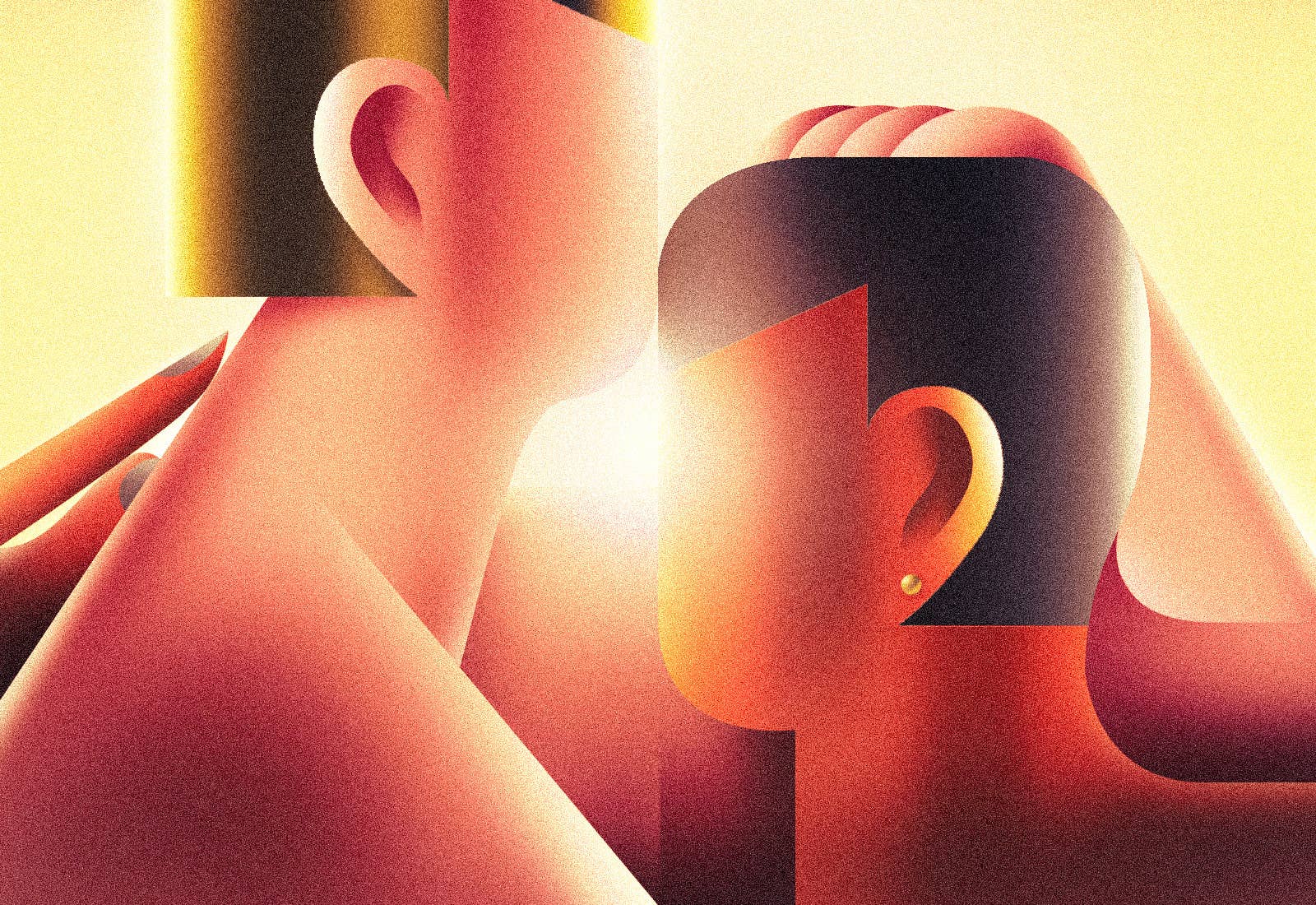
When I asked Jana, a 21-year-old grad student from Florida, how men react when she tells them she doesn’t want to have sex with them after the first date, she said that so far, Gen Z men are mostly down to respect her boundaries. It’s the millennials who try to pressure her into casual sex. Most men her age say something like, “OK, cool. No problem.” But it’s “that 26-and-up crowd that tries to guilt you into having sex anyway; they try to make you feel bad about it,” she said. “They're like, ‘But I just paid for your dinner,’ or, ‘I picked you up,’ or, ‘I gave you gas money…and you still won’t have sex with me.’ I would expect it to be the other way around.”
In 2018, the Atlantic declared young Americans to be “in the midst of a sex recession.” Last month, the New York Times proclaimed, “Younger Americans are, infamously, less likely to have sex than their parents’ generations — and when they do have sex, they’re doing it with fewer partners.” Online, a loose cultural consensus has emerged: Gen Z is a sex-negative — even regressive — generation. Social media users have coined the term “Puriteens” to condemn young people who are trying to “cancel porn,” censor kink at Pride, decry relationships with age gaps, skip sex scenes, or, most recently, scold parents for having audible sex while their children are home. It’s fair to push back on anyone trying to enforce militant moral boundaries around sexual expression. But valid criticism of Twitter’s most vocal minority slips easily into unchecked condescension. Last month, Vanity Fair’s Richard Lawson wrote, “it is tempting to … declare everyone 30 and younger to be puritanical prudes whose minds have been warped by too many hours spent online.”
Talking to them, it’s clear that a decline in young people’s sexual activity isn’t always a bad thing. Sometimes it simply means they’re having less bad sex.
I'm 23 and skeptical of sweeping dismissals of young people's ideas. I talked to 15 members of Gen Z, aged 18 to 26 — and read through 200 responses to a BuzzFeed News form — to better understand how my generation thinks about sex. What I found was, unsurprisingly, more nuanced and less dire than people online seem to think. People abstaining from sex in the long term were supportive of everyone else’s right to have sex however they chose, provided their partners were consenting adults. People looking for emotional connections in monogamous sexual relationships also appreciated the value of casual engagement; often they’d tried both. People who talked freely and joyfully about their “high body counts” also reflected rigorously on what they wanted out of sex and why.
Jana isn’t opposed to having sex on the first date. It’s something she’s comfortably done before, and she has no judgment for the people who continue to do so. What makes her uncomfortable is the expectation that she should be ready for sex immediately and transactionally, as a way of reciprocating men’s interest. Recently, she’s been thinking a lot about her early years of sexual exploration. “I feel like high school was probably when I was moving the fastest,” she told me. “That was the point where my self-esteem was at an all-time low. … Part of me was bouncing from person to person, trying to find someone that liked me, because I didn't like myself.”
Rohit, a 22-year-old college senior from California, who requested not to use his real name for this piece, has also been thinking about the link between his sex life and his self-esteem. “For part of the [past] year I struggled to find a job,” he said. “I was feeling low about myself, and I would self-medicate with Grindr. … But since getting a job offer, my sense of ego has come back, and I have found myself less interested in sex.” Like Jana, he’s also noticed “a slight generational divide” in which “younger gay guys in my age range are interested in monogamy” while “the older millennials I’ve hooked up with are more open.” He speculated that Gen Z gay men, who came of age after the legalization of gay marriage in America, are more likely to see long-term partnership as an option for them than their predecessors did.

Jana and Rohit’s personal observations align with a broader trend journalists have noticed among members of Gen Z. Many young people are interrogating their relationships to sex positivity, looking beyond the idea that casual sex is “inherently liberatory” toward a more individual set of questions about what kind of sex they’re having and why. Talking to them, it’s clear that a decline in young people’s sexual activity isn’t always a bad thing. Sometimes it simply means they’re having less bad sex. They’re less interested in pursuing sex they don’t really want to have, or that their partner doesn’t really want to have.
Of course, it is more than a little futile to make sweeping claims about the sexual values of an entire generation. The idea that people’s perspectives are more highly correlated by age than by class or geography is a marketing tool, rather than a statistical truth. And “Gen Z” specifically can feel like a shorthand for a subset of young people who spend a lot of time online. (Certainly, the self-selecting group of respondents to this BuzzFeed News form are more likely to be frequently online.)
But if other people are going to insist on this framing — in which Gen Z is a self-contained entity brewing up dangerously moralizing views about sex on the big, bad internet — I’d at least like to propose a different story. In the course of my reporting, I’ve encountered an array of young people who are curious, compassionate, and intent on having better sex in a better world. They understand that “sex is about so much more than the act.” They are interested in cultivating their own healthier relationships with intimacy.
“In the straight world of sex, there is this expectation that it's just penis in vagina, and that's all that sex is.”
Kate, a 23-year-old teacher from Manitoba, Canada, told me that while she used to think “simple answers like yes and no were enough to constitute consent,” she’s now “much more focused” on her partner’s “body language.”
“You need to really be in tune with how people are reacting to you,” she said; after all, mutual attention is what makes sex fun. Young people like Kate aren’t interested in operating on what Melissa Febos calls “empty consent,” a verbal yes that belies internal discomfort or ambivalence. They don’t just want legally defensible but mediocre sex. They want good sex. They want the palpable but intangible feelings of shared excitement; they want intimacy.
This is hardly indicative of Gen Z’s grand return to conservative sexual values. Rather, this critical self-examination reveals a desire for greater freedom and autonomy. When young people believe that the right to refuse sex is as vital as the right to choose it, they prove their desire to complicate and advance progressive ideals, not dismiss them.
But for Jana, Rohit, and Kate to learn how to move beyond half-hearted sex, they had to have sex. Part of the collective concern over young people’s sexlessness has to do with them becoming sexually active later. How will they figure out how to cope with the risks and vulnerabilities of intimate interaction if their knowledge of sex remains theoretical into adulthood? But Lilian, an 18-year-old high school student from Massachusetts, who has not yet had sex, has learned a lot from reading about the sexual experiences of other autistic women — many of whom, like her, need to manage sensory overstimulation in daily life. “If you decide you want to have sex,” Lilian told me, “it’s important to be open and communicative about what you like in terms of sensations. [You can say,] ‘Don't kiss me,’ or, ‘Please be very gentle with my body; I'm very sensitive to sensations on my skin.’”

At the vanguard of new ways of thinking about sex are people of marginalized identities — for example, autistic women like Lilian, queer people like Kate, or anyone else who knows the standard pop cultural scripts about sex won’t work for them. “Because people don’t talk a lot about gay sex in media, movies, TV, or even sex ed, you have to make your own trail,” Kate told me. But she also feels like being “forced to fight for [sexual liberation] more actively than my straight friends” has opened her mind. Anna, a 23-year-old student from Seattle, agreed. “In the straight world of sex, there is this expectation that it's just penis in vagina, and that's all that sex is,” she said. Among her queer social circles, people are more willing to experiment with other possibilities for pleasure. Rohit, meanwhile, observed that he has had sex sober much more often than his straight friends, who “will get drunk or high…at a frat party, see someone, and naturally fall into something.” He’s had to be more deliberate about seeking sex, but that conscious exploration has taught him a lot.
Here lies the other, almost infuriatingly obvious problem with assuming Gen Z has swung back around to sexual conservatism: Gen Z remains a bastion of progressive values around sex and gender. They increasingly identify as queer, and they outstrip every other generation in their acceptance of gender fluidity. The most interesting arguments about Gen Z’s drifts toward so-called prudery take this into account; sometimes regressive ideas proliferate because they’re couched in progressive jargon. As political writer Alex Hochuli told MEL Magazine in 2021, claiming that a college-aged woman can’t properly consent to sex with a man in his thirties is “a means of smuggling in social conservatism under the guise of protecting the vulnerable.” Still, much of Gen Z remains steadfastly interested in subverting tradition, notwithstanding the inevitable mistakes that come with refining one’s imperfect politics in public.
Take how young people think about porn. Free, accessible porn, especially from huge corporations like Pornhub, is supposed to be the basis of my generation’s unique sexual education. In 2022, 18- to 24-year-olds made up 27% of Pornhub’s self-reported traffic, the most of any age group. But, though everyone I talked to used mainstream porn to some degree, most expressed ambivalence about how estranged it could feel from eroticism. Diego, a 23-year-old journalist from Mexico City, told me he found reading erotic fiction to be “more nurturing, spiritually and emotionally,” than passively absorbing visual media because “fantasizing becomes more personal when you use your imagination.” Nico, a 20-year-old student from Michigan, said they like “being able to imagine [erotic stories] in whatever attractive voice I want.” Other people preferred the characterization and plot of written smut, finding sex in context more erotic than sex in a vacuum — or clichés of the mainstream porn world, like a plumber showing up at a woman’s door and, one jump cut later, fucking her.

When it came to watching porn, some people favored “gentler” categories, like lesbian, vintage, or amateur videos. Lilian told me she preferred lesbian porn because “a lot of the heterosexual porn always felt graphic. There was always an element of violence to it, and I never truly felt like any of the women or AFAB individuals in it were enjoying it. … That was very disturbing to me.” On the other hand, D, a 25-year-old social worker from Michigan, who asked not to be identified by her full name, deemed much of mainstream porn sanitized, calling it “Barbie sex” with “not a drop of hair, not a drop of moisture anywhere.”
“Part of the fun of sex is the messiness,” she told me, and there’s “a fine line” between “disgust and lust.”
Even those who had a mostly positive assessment of porn were attuned to its drawbacks. Cameron, a 23-year-old student from Minnesota, who said porn “can be a positive thing for developing teenagers” because it is “more encompassing than sex ed,” also noted that it could give viewers “unrealistic expectations of what sex can be,” which could be “damaging to the psyche.” He’d read stories about other people’s “extreme cases of porn addiction” that made him worry about how porn could make real-life interaction less satisfying; in his own life, he reflected that when he was using porn more frequently, he “maybe had less of a capacity to form relationships or to be content in a relationship sexually.” Since then, Cameron has consciously limited his porn consumption. Others I spoke to came to the same decision when they learned about the exploitative conditions under which much mainstream porn is made or distributed.
If this sounds familiar, perhaps you’ve read The Right to Sex, a 2021 collection of essays by feminist philosopher and Oxford professor Amia Srinivasan. In “Talking to My Students About Porn,” Srinivasan observed that her students, “like the anti-porn feminists of the 1970s, traced a straight line from the consumption of porn to the negative treatment of women by men.” Her students long for a better alternative, but the essay treats porn as the internet’s only option for sex education. But many young people are supplementing their sex ed more deliberately.
Respondents cited multiple major platforms — including Teen Vogue, Cosmopolitan, Planned Parenthood, and sexual health site Beducated — as trusted sources for information about sex. Strikingly, though, many preferred their education to feel more personal. They learned about sex from YouTube videos by creators like Laci Green, Anna Akana, or Dr. Lindsey Doe; Instagram posts from queer influencers like @mattxiv or sex therapists like @yourdiagnonsense; or podcasts, both those that consistently address sex, like Call Her Daddy or Whorible Decisions, as well as stand-alone episodes featuring sexperts like Dr. Emily Nagoski. Overwhelmingly, young people were drawing from information that bore the distinct fingerprints of the individuals sharing it; they weren’t only seeking education, but reassurance that they weren’t alone.
“When I first had a boyfriend, it was the cool thing to talk about all of the really gross, really niche details about your sex life. But I also feel like maybe I shouldn't have said all of that. It feels nice to not have to share everything.”
Grace, a 23-year-old writer from Illinois, told me she often checked Reddit when she had a question about her sex life that made her wonder, “Is this normal?” She liked that the forums gave her insight into the feelings of a “broad variety of people”; it helped to see other people giving voice to private insecurities she’d nursed. Nico, meanwhile, told me they enjoy watching TikToks from twentysomethings who call themselves “late bloomers” because they have never been kissed. “I’ll think: We are living the same life,” Nico said. “It does help me feel a little less alone. But it still doesn't make it any less hard.” Lilian raised the same point. Though it’s “isolating” to “know very few autistic women” in real life, she said, “I really appreciate when individuals share their firsthand experience. It helps me not feel as alone.”
Offline, too, young people are prioritizing how their sex lives feel to them over how they seem to other people. Cameron told me he’s tired of people who place a premium on their “controlled sexual image.” Jonathan, a 22-year-old illustrator from New York, told me he gets “stressed out” about sexual gossip and the pressure to cultivate a good public reputation around one’s sex life, which he wishes could be private. As he told me, “A lot of people tend to focus on [the question of], ‘How good is he in bed?’”
Anna has become “incredibly private” about her sex life in recent years, out of respect for her partner’s boundaries. “When I first had a boyfriend, it was the cool thing to talk about all of the really gross, really niche details about your sex life,” she told me. “All my friends did it. And so I felt the need to do it as well.” Though she still thinks it’s important to normalize sex by talking about it, especially among women working to eradicate shame around their sexuality, she’s more discerning about what she shares. Grace offered similar reflections. Looking back on tell-all conversations she once had with friends about her sex life, she told me, “I’m glad that we had a safe space that we could share that in … But I also feel like maybe I shouldn't have said all of that. It feels nice to not have to share everything.”

It seems that the people I talked to have intuitively picked up on a distinction articulated by Mark Greif in his essay “Afternoon of the Sex Children”: When it comes to sex, “what has passed as liberation has often been liberalization.” If sexual liberation frees anyone to pursue any kind of sex, liberalization makes sex into a commodity — meaning, sex is socially valuable, but only if it’s the right kind. So people put themselves through hell to adhere to beauty standards: They shave, lift weights, undergo expensive (or dangerous) surgeries, and diet a hundred different ways until they finally stop eating. They post thirst traps, brag about getting laid, and otherwise labor to prove that they are having sex so they seem like successful members of society. “But a test of liberation, as distinct from liberalization,” Greif writes, “must be whether you have also been freed to be free from sex, too — to ignore it, or to be asexual, without consequent social opprobrium or imputation of deficiency.”
That is clearly not yet true. Bea, a 26-year-old radio producer from Nebraska, had sex for the first time three and a half years ago. She requested not to use her real name for this piece, because she expressed that she has “so, so much shame about my lack of a sex life in high school and college.” She regularly sees a sex therapist, which she says has been helpful. But she told me that remembering how “excluded” she felt during college, when she would “play along” with others’ conversations about sex but then “go home and cry all night,” “really hurt — and still does hurt, frankly.” Jonathan, who has not yet had sex, felt similarly isolated. “People my age are all about Tinder… I don't resonate with it. That's just how I am. And I've felt very left out, like no one else gets me.” He’s wondered repeatedly if he needs to stop being so “monogamous,” “romantic,” or “traditional,” asking himself, “Should I go ahead and accept this hookup culture that we have? … Is that how I should be? Do I want to change?”
In worrying about the statistical decline of sex among young people, we have elided the question of how to differentiate between good sex and bad sex, wanted or ambivalent, connected or empty.
We shouldn’t return to a world where private sex is considered morally superior to public sex. But it’s understandable why young people might be seeking forms of sex — including education and conversation about sex — that feel increasingly private and intimate to them. They are trying to escape the saturation of rote sexual imagery in mainstream porn, entertainment, social media, and advertising. They are seeking the “internal sense of satisfaction” of eroticism over the commodity of sex.
To be sure, a free society is one that accepts diverse forms of sexual expression without demanding justification for them. And a knee-jerk rejection of perceived puritanism is to be expected in a country just decades removed from Prohibition and the Hays Code. But we shouldn’t emphasize quantity over quality. In worrying about the statistical decline of sex among young people, we have elided the question of how to differentiate between good sex and bad sex, wanted or ambivalent, connected or empty.
The members of Gen Z I talked to described good sex as present, passionate, communicative, safe, and trusting. They said it could take place with a stranger, a friend, a casual partner, or a romantic one. They took verbal consent as a fundamental given, and they affirmed the importance of body language and nonverbal cues. They told me that freely given enthusiasm and mutualism were essential to making sex feel good.
Gen Z is trying — sometimes hastily, sometimes ahistorically, but often earnestly — to envision a more liberated landscape for sex the way we want to have it. It’s made us curious about how to make sex more intimate — not by doubling down on monogamy or marriage or other limiting structures, but by forging a new, nameless kind of communication that we have not been taught. And we don’t merely crave intimacy because we spend too much time at home, on the internet, refusing to touch grass. We crave it because all people do. ●
